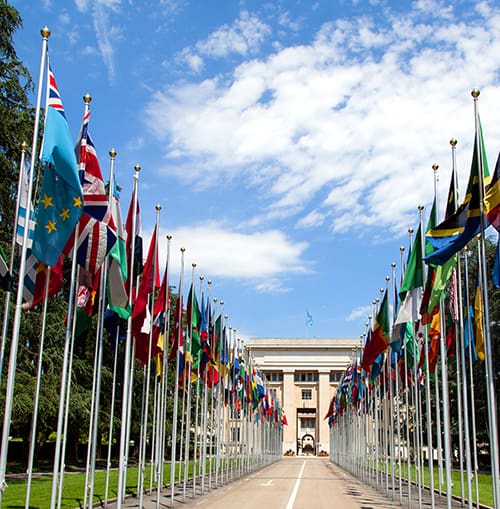This week begins a new thematic thread conceived around the topic, “The State and International Relations, Ethnographically: Sites, Objects, Lives.” Consistent with the overall spirit of Allegra, the contours of this topic remain open and “in formation.” Though the anticipated outcome of the thread is a virtual magazine issue, the topic itself is as much a provocation as a pre-defined field. Indeed, this is partly the point. In soliciting contributions for this thread, we seek work that is suggestive of new ethnographic strategies for accessing the constitutive fabrics of the state and international relations. This effort builds on a wealth of anthropological scholarship on the state that has emerged over the past twenty years.
Ethnographic accounts have illuminated how states’ boundaries are constituted socially and enacted contingently at the frayed edges at which “the state” interfaces and overlaps with civil society, NGO, and community actors (see Das & Poole 2004; Gupta 1995; Park & Richards 2007; Sharma 2006, among others).
But the ethnographic study of the state is only beginning to deal with the state’s construction in international relations, law, and diplomacy.
 Meanwhile, while there has been talk of an “ethnographic turn” in the field of international relations (“IR”), IR scholars continue to debate what “ethnography” entails in this context, and how it should impact the way the field conceptualizes its objects of analysis, and frames its research questions (see Lie 2013, and works cited therein).
Meanwhile, while there has been talk of an “ethnographic turn” in the field of international relations (“IR”), IR scholars continue to debate what “ethnography” entails in this context, and how it should impact the way the field conceptualizes its objects of analysis, and frames its research questions (see Lie 2013, and works cited therein).
As the title of this thread implies, deepening our ethnographic engagement with the state and international relations will involve tracking their emergences across a wide range of places, things, persons, and the multiplex social, cognitive, and affective relations between them. It will also involve finding creative ways around political and bureaucratic barriers that Jon Harald Sande Lie (2013:205-6) notes often limit anthropologists’ ability to use our full ethnographic toolkit when studying states and international organizations. We hope that this week’s post will spark fresh ideas about both, but above all, we hope that you will enjoy them!
Works cited
Das, Veena, and Deborah Poole, eds.
2004 Anthropology in the Margins of the State. Santa Fe, NM: School of American Research Press.
Gupta, Akhil
1995 Blurred Boundaries: The Discourse of Corruption, the Culture of Politics, and the Imagined State. American Ethnologist 22(2):375-402.
Lie, Jon Harald Sande
2013 Challenging Anthropology: Anthropological Reflections on the Ethnographic Turn in International Relations. Millennium: Journal of International Studies 41(2):201-20.
Park, Yun-Joo, and Patricia Richards
2007 Negotiating Neoliberal Multiculturalism: Mapuche Workers in the Chilean State. Social Forces 85(3):1319-39.
Sharma, Aradhana
2006 Crossbreeding Institutions, Breeding Struggle: Women’s Empowerment, Neoliberal Governmentality, and State (Re)Formation in India. Cultural Anthropology 21(1):60-95.






